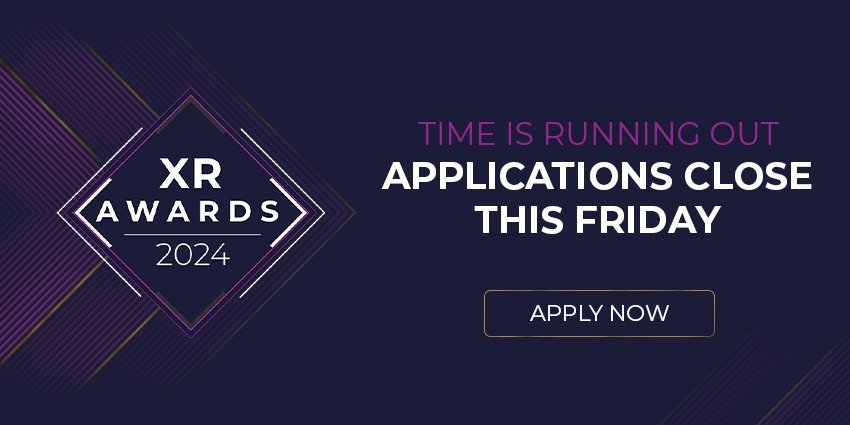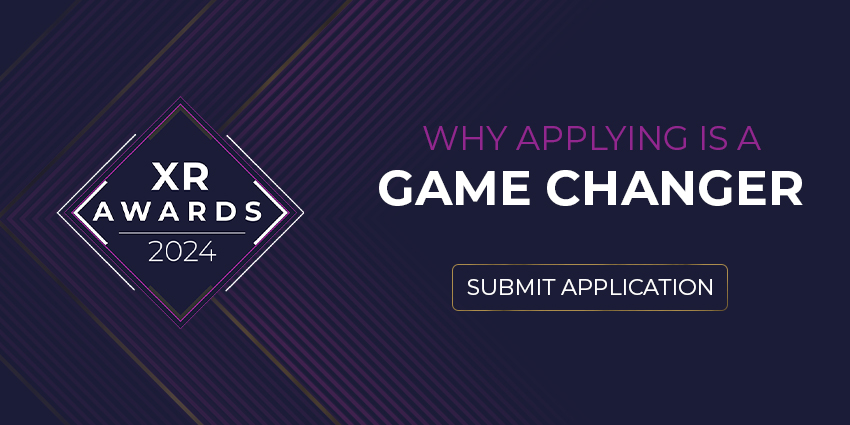Last week, Augmented World Expo EU (AWE) 2023 hosted its yearly event highlighting recent innovations in enterprise-grade AR/VR/MR solutions, as well as related emerging technology such as genAI, digital twins, and geospatial tech.
Opening the event, Ori Inbar, the Co-Founder of AWE and Super Ventures, said the event aims to “celebrate and accelerate” the industry. AWE 2023 achieved this by inviting an esteemed lineup of XR firms, thought leaders, and end users, uniting the immersive technology industry at the event’s Vienna, Austria location.
Inbar also noted that there is a shift coming, where 2023 is proving to be a “pivotal” year for the XR industry. He cited ARtillery data, highlighting how, in 2023, XR will become a “$38 billion” industry. Moreover, the collected data showcased how roughly 1.2bn users leverage AR/VR, and 606 million users leverage Metaverse services across 70 platforms – “so the Metaverse is not so dead after all,” Inbar remarked.
To mark the shift towards a positive end of 2023, following a shaky start to the year, AWE brought together firms such as Meta, Lenovo, and HTC VIVE to highlight the forecasted industry upturn.
AWE 2023: Meta Quest for Bussiness to Launch this Year
This month is proving pivotal for Meta’s current wave of XR hardware. Following Connect 2023, the firm worked hard in October to debut its Quest 3 MR headset and Ran Ban AR smart glasses. Earlier this month, Meta showed up at IGS 2023 to showcase Meta Quest for Bussiness, and last week, the firm’s Senior Director and Global Channel Partnerships at Reality Labs Era Sahni, took the AWE 2023 stage to discuss how XR can assist in transforming workplace communications.
During the session, Sahni said:
Mixed reality is revolutionising the way we work today, and it’s only going to accelerate from here. As a Channel Director at Meta, my job is to help companies adopt new technologies that will help their employees feel more connected, collaborative, and empowered at work. – Mixed reality is not just looking into the future of work. It’s delivering real value today, not just to people at home but also to businesses. But it is easy to overlook that business use. Because it is true to say that, to date, it is the gaming consumer that has driven the success and growth of VR. But if you look at the history of technology adoption, right from the use of personal computers to the internet and cell phones. Time and time again, we have seen how important businesses have been to scale that technology adoption.
Sahni also noted how MR technology drives positive business outcomes across four key areas: Learning & development, creativity & design, meetings and collaboration, and community building. According to Sahni, Meta is working with a select lineup of enterprise end-users to demonstrate excellence in the four key areas – some of those companies being Accenture, Pfizer, and Purina.
Moreover, Sahni quickly highlighted the importance of working with third-party software vendors to ensure the success of enterprise VR programs. The Meta representative noted that the firm works with more than 900 independent software companies to provide ongoing XR growth.
Speaking on Meta’s “ecosystem” of software solutions, Sahni said that “over the last 18 months, a large part of our focus has been developing partnerships to bring a lot of VR experiences into our Meta Quest App Store and integrate them directly into our products,” with many of those applications ready to assist enterprise customers succeed it Meta’s laid out four key areas – including essential workplace tools like Zoom.
Sahni also highlighted how new workplace applications are coming to Quest 3, including Microsoft Mesh, Windows 365, and Adobe High Five.
However, the enterprise XR growth journey doesn’t end with finding the proper application. Before deploying a workplace immersive solution, an IT team must ensure various workplace considerations that may create hurdles and pain points.
The responsibility also falls into the hands of the headset vendors who advertise their products as suitable workplace tools. This also affects long-term adoption rates for XR as poor-performing workplace XR tools will lead to a decline in interest and faith among end-users.
Meta understands this and is adapting its Quest portfolio to ensure end-users receive a device ready for a workplace use case.
Sahni explained that last year, Meta announced Meta Quest for Bussiness. This “solution makes these [XR] devices work-ready,” she added that “over the last 12 months, we’ve actually worked with lots of customers and understood there are three big things they are looking for.” According to Sahni, enterprise end-users are looking for a simple way to deploy Quest devices. Meanwhile, IT admins want more flexibility over the end-user experience and training customers who wish to use shared device mode.
Meta Quest for Bussiness has been operating as a Beta service since its launch. However, Meta is planning to debut the service later this year.
AWE 2023: DigiLens Gains AI Features
Smartglasses are gaining a quick reemergence in the XR space, with thanks to genAI, which is finding a home on smart glasses – in most cases, providing a digital assistant service. Last week, at Snapdragon Summit 2023, Meta also noted the importance between AI and smartglasses with the firm’s Head of Hardware Partnerships, Jenniffer Hom, noting that “smartglasses will become the eyes and ears for virtual AI assistants.”
Another firm understanding of this trend is DigiLens. The firm is partnering with Phantom Technology to integrate “spatial AI assistant” services into its ARGO smart glasses. The firms are collaborating to improve the opportunities for leveraging AR wearables in the workplace.
The partnership deploys Phantom Technology’s CASSI platform to ARGO. The CASSI AI integration allows ARGO glasses to understand the real-world context around them, making the device ready to detect a user’s surrounding workplace.
Moreover, ARGO enterprise end-users can access CASSI features using voice activation, such as Spatial Search, Contextual Assistant, and Task Management.
Farbod Shakouri, the Co-Founder & CEO of Phantom Technology, added:
DigiLens ARGO is the perfect platform for combining vision AI with modern LLMs, which takes AR to a whole new level. We have seen the impact of generative AI with chatbots and images, but we’ve yet to see this applied to real-time AR. The most exciting opportunity with this partnership is versatility. For traditionally costly enterprise projects, AI can now provide extensible, scalable, and versatile solutions at a fraction of the cost.
Additionally, Brian Hamilton, the VP of Sales and Marketing at DigiLens, said that an ARGO device integrated with the CASSI spatial AI assistant platform will “change the future of mobile computing as we know it – for the better” while also noting that “DigiLens is excited to partner with Phantom Tech to deliver this AI-enabled technology for our customers to help optimize their workflows significantly.”
AWE 2023: Designium Showcase Prototyping Platform
During AWE 2023, Designium showcased its AR prototyping platform. The firm designed the service to accelerate the growth of XR business services.
The firm was showing off its Rapid Visualization/Rapid AR Prototyping system to AWE attendees, highlighting how brands can involve their marketing in creating immersive campaigns.
According to Designium, the firm’s prototyping resources are interoperable and cover a range of devices and web apps. The Rapid Visualization/Rapid AR Prototyping system also helps businesses leverage visual positioning systems (VPS), AI technologies, and the post-prototype development phase.
AWE 2023: Lenovo on its Enterprise First XR Strategy
Lenovo is working hard within the busy XR marketplace to debut a product portfolio of enterprise-grade immersive hardware. At AWE, Johannes Stettmeier, Business Development Manager for AR/VR Technologies at Lenovo, took the stage to explain how some of the most fruitful use cases for XR exist in enterprise, not in consumer or gaming.
Stettmeier added:
People have realised you can interact via video conferencing. What is now our mission is to tell people that 3D, immersive collaboration is a good thing to do because it brings you a new dimension of engagement.
Moreover, Stettmeier noted that Lenovo is taking an enterprise-first approach to developing XR solutions, meaning you cannot purchase the device via conventional means such as Amazon. Instead, a buyer must go through professional channels – “because we really want to make this an enterprise story,” Steinmeier said.
Stettmeier highlighted how an enterprise XR journey comprises content creation and delivery. Within those areas also exist a range of related technology and considerations. Levono is working with various third-party and first-party services to provide a content ecosystem for the firm’s ThinkReality ecosystem.
Moreover, during the session, Stettmeier showcased its touted ThinkReality VRX enterprise headset, which comes with leading features such as 6 DoF, full-colour MR passthrough, OpenXR SDK, and Unity/Unreal engine support.
Stettmeier also showcased the Lenovo ThinkReality Cloud platform, an MDM platform for seamless integration and deployment of the firm’s headset portfolio. Additionally, Lenovo is building TruScale, a device-as-a-service platform which assists companies with investments in Lenovo brand headsets.
Stettmeier explained:
Every week, you have another announcement of a new device, the next big thing. So when is the right time [to invest]? Its never. This industry is so dynamic, it’s so innovative, and it’s so young, there is never the right time, except if you have the right strategy for it, and that’s device as a service. Because in Lenovo, device as a service means you pay a monthly fee, bu you have a return policy in there which enables you at any point to return all the devices you bought and replace them with either a new device from Lenovo based on a new platform, or you can even have an exit strategy that we buy the devices back. That gives you, as the enterprise, the security that you’re not investing in a one-way road – without an exit strategy.
TruScale answers a pain point in the industry, which sees some end-users facing hurdles when finding a suitable long-term XR investment roadmap, with Lenovo now offering a solution via its streamlined access to XR headsets.
AWE 2023: HTC VIVE on Real-World Use Cases
HTC VIVE is a significant player in the enterprise XR space. The firm has been active in the AR/VR/MR space for several years. Across that period, the firm has seen many waves of interest come and go in the XR space for consumers, enterprises, and beyond.
Thomas Dexmier, AVP of Business Development and Enterprise Solutions at HTC VIVE EMEA, joined AWE 2023 to discuss the uptrend in XR applications across the workplace.
The exec highlighted various use cases whereby XR solutions drive positive outcomes for workers and decision-makers. During the session, Dexmier showcases how Virtalis and Ford Motor Company leverage digital twins to improve workflows covering collaboration, reviewing, and on-site inspections.
Moreover, Dexmier highlighted how the healthcare market is seeing an XR uptick due to recent positive outcomes recorded by international facilities. Dexmier cited a 2023 survey of 400 healthcare professionals on the state of XR training, which highlighted how 91 percent agree that XR enhances education in the sector, 75 percent agree it improves learning speeds, and 86 percent say they will adopt XR training by 2026 – a lucrative insight.
Moreover, XR training can also have a tremendously positive sustainability impact. One of HTC VIVE’s enterprise customers, FLAIM, creates immersive training solutions for firefighters, which saved roughly 20 million litres of water and 27 tonnes of carbon emission – based on 2,000 hours of training.
Closing the session, Dexmier remarked:
So you can count on us, HTC VIVE, to continue to drive and support the business and enterprise world to give them all the solutions they need to continue to drive [XR] adoption. To help us innovate, we continue to listen to our partner’s feedback.
What’s Next for the XR Industry?
2023 is not over yet. 2024 is looking to be a massive year for the industry. However, based on the information gathered across AWE EU 2023, many firms are still planning to announce important enterprise-grade XR solutions and updates.
Moreover, AWE 2023 hosted several other fantastic keynotes and exhibitors showcasing the best in XR across countless use cases from consumer to enterprise and everything in between.
As the year concludes, CES 2024 will quickly open the year where firms historically announce game-changing technology.







